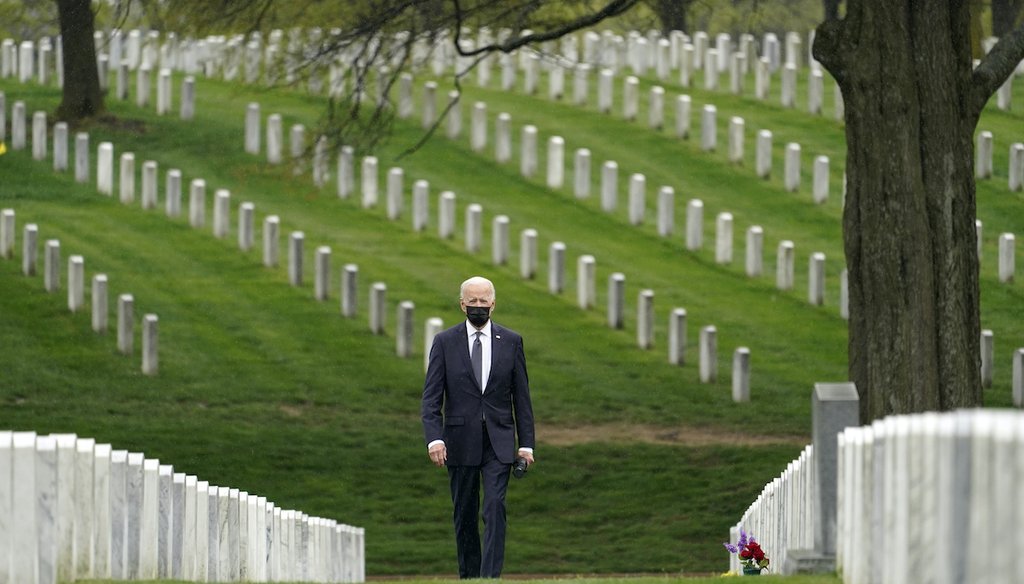Stand up for the facts!
Our only agenda is to publish the truth so you can be an informed participant in democracy.
We need your help.
I would like to contribute
Joe Biden announces total Afghanistan withdrawal by Sept. 11, 2021

President Joe Biden walks in Arlington National Cemetery after announcing the withdrawal of the remainder of U.S. troops from Afghanistan by Sept. 11, 2021. (AP Photo/Andrew Harnik)
President Joe Biden moved closer to keeping his campaign promise to get American troops out of Afghanistan.
Speaking from the same room where, in 2001, then-President George W. Bush announced the first strikes on terrorist training camps in Afghanistan, Biden said all forces would leave the country by the 20th anniversary of the 9/11 attacks.
"We went to Afghanistan because of a horrific attack that happened 20 years ago," Biden said April 14. "That cannot explain why we should remain there in 2021."
Biden took office facing a May 1 withdrawal deadline agreed to by his predecessor, former President Donald Trump. Biden said he would honor that, although he redefined the terms. The original agreement said the U.S. and its allies "will complete withdrawal of all remaining forces from Afghanistan" by that date.
Biden said the final withdrawals — of both American and NATO forces — would begin on May 1.
His move drew approval from those who have long argued the U.S. should leave.
"The war in Afghanistan has not been vital to U.S. security and prosperity for over a decade, and should have ended long ago," said the Atlantic Council's Christopher Preble April 14. "Biden has the opportunity to do what three of his successors failed to accomplish, and setting out a 9/11/21 marker should help."
American forces in Afghanistan currently number about 3,000. NATO allies also have military missions in the country. Biden said the U.S. will continue to support the Afghan government. In March, John Sopko, special inspector general for Afghanistan reconstruction, told a House committee that $8 billion remained to be spent.
Sopko painted a bleak picture of conditions in the country. Talks with the Taliban remain tenuous, and the group has continued to attack government forces.
"Security remains the most crucial and enduring high-risk area for Afghanistan, because the Taliban have not significantly changed their high levels of violence, or military and political objectives," Sopko said March 16.
Republicans, including Senate Minority Leader Mitch McConnell, criticized Biden's plan. McConnell called it a "grave mistake," saying there was still work for the U.S. to do in Afghanistan.
Foreign policy analyst Michael O'Hanlon at Brookings, a Washington policy center, also said the decision does little good.
"It deprives us of leverage, reduces the odds of a negotiated settlement, heightens the risk of war — and, in my estimation, also of ethnic cleansing, state collapse, and perhaps the effective partitioning of the country," O'Hanlon said April 14. "All to bring 3,000 or 4,000 troops home. I think it's a poor strategy."
Biden rebutted those critiques, saying waiting for the right conditions has consistently led America down the wrong path.
"When will it be the right moment to leave?" Biden asked. "One more year? Two more years, 10 more years? Ten, 20, 30 billion dollars more on top of the trillion we've already spent? Not now? That's how we got here."
He argued that the original goal to prevent Afghanistan from serving as a launchpad for terrorist attacks on the U.S. had been accomplished. America, he said, needed to focus on the challenges of the next 20 years, not the past 20.
For now, the American troop posture remains in place, so we continue with our rating of In the Works.
Our Sources
White House, President Biden delivers remarks on the way forward in Afghanistan, April 14, 2021
U.S. State Department, Agreement for Bringing Peace to Afghanistan, Feb. 29, 2020
House Committee on Oversight and Government Reform, Statement of John F. Sopko, March 16, 2021
Mitch McConnell, Statement on Afghanistan, April 13, 2021
Washington Post, Biden will withdraw all U.S. forces from Afghanistan by Sept. 11, 2021, July 13, 2021
Email exchange, Michael O'Hanlon, senior fellow in foreign policy, Brookings Institution, April 14, 2021
Email exchange, Christopher Preble, co-director, New American Engagement Initiative, Atlantic Council, April 14, 2021
